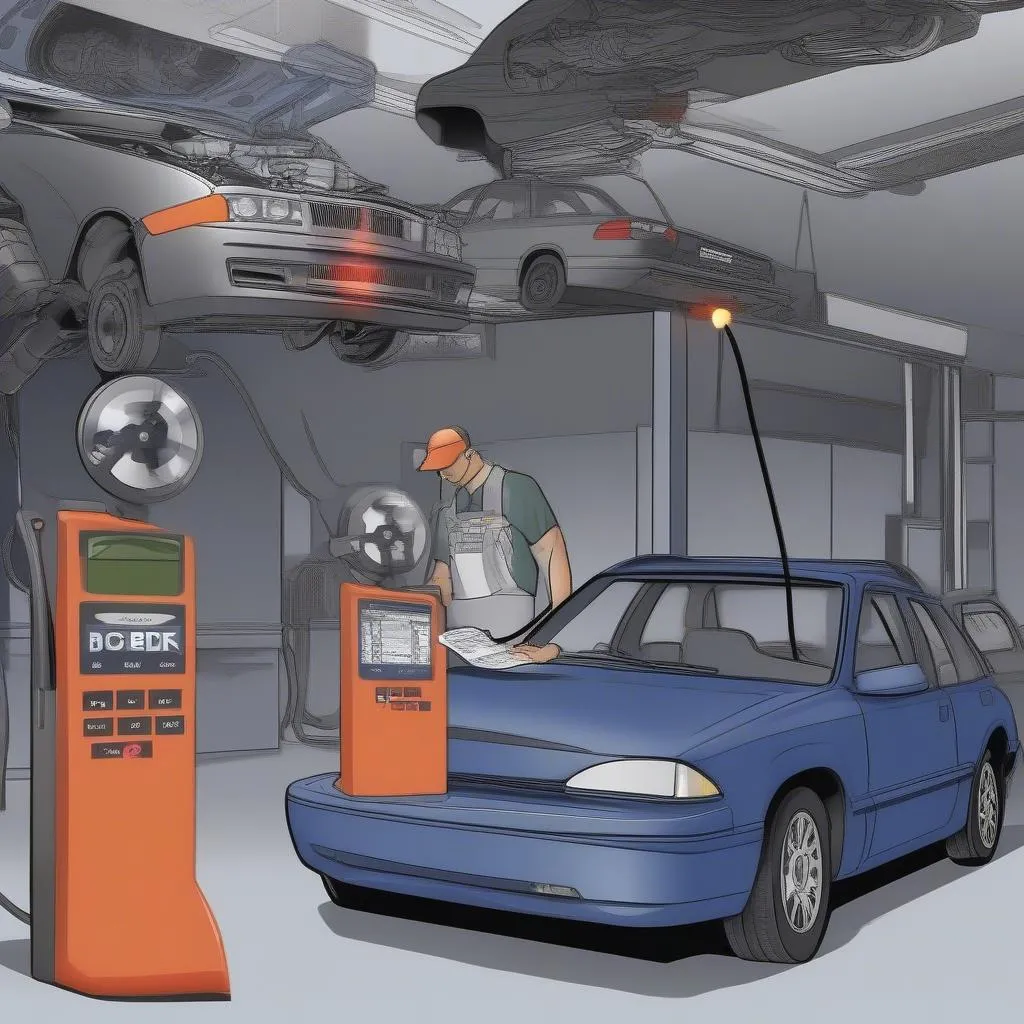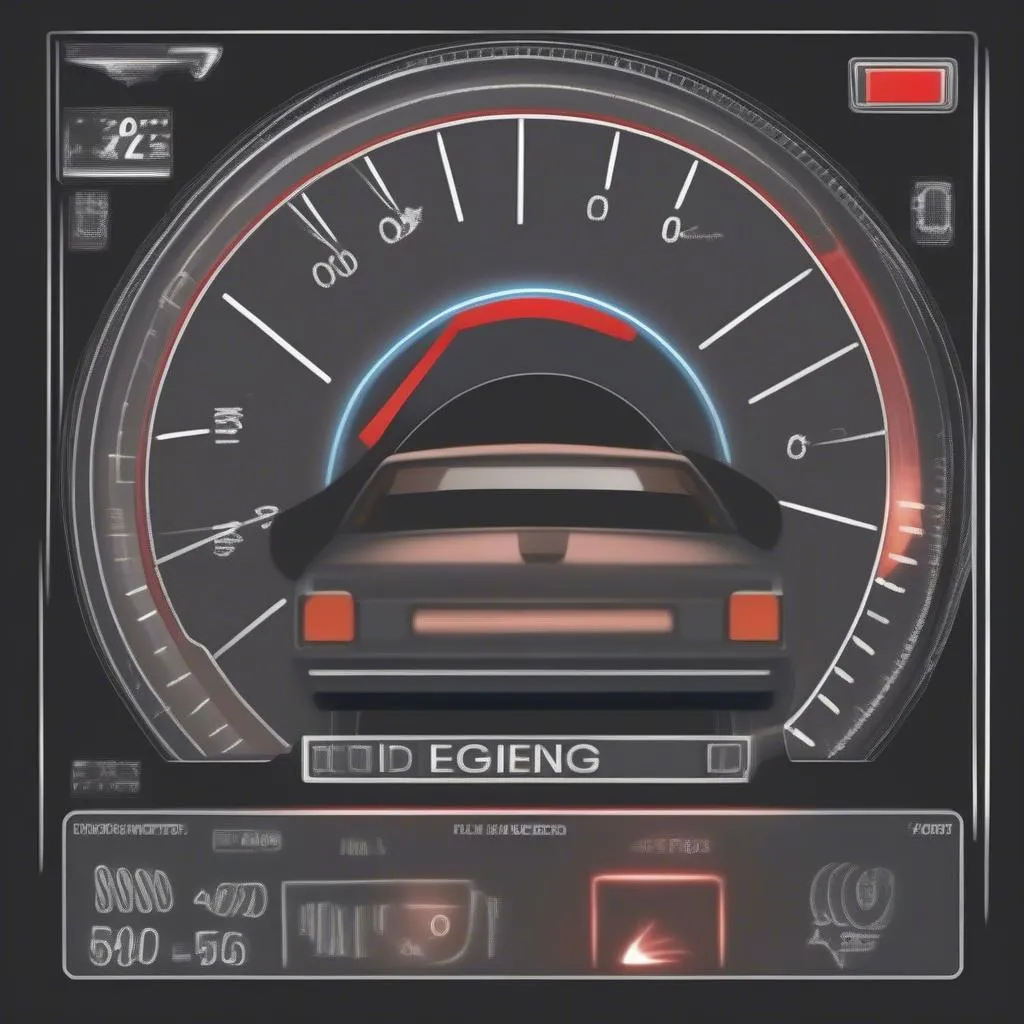Let’s imagine this: You’re driving down the highway, enjoying the open road, when suddenly a little orange light pops up on your dashboard – the dreaded check engine light. You sigh, thinking, “Here we go again.” It’s a common occurrence, and often, the light goes off as quickly as it appeared. But what does it mean? Why does the check engine light flicker on and off?
What Does It Mean When The Check Engine Light Flickers?
The check engine light is designed to alert you to a potential issue with your vehicle’s emissions system. It’s activated by the On-Board Diagnostics (OBD) II system, which constantly monitors your car’s performance. When the OBD II detects a problem, it sends a signal to the dashboard, illuminating the check engine light.
From a Mechanic’s Perspective
As a mechanic specializing in European car diagnostics, I’ve seen countless cases of flickering check engine lights. From my experience, the most common reasons are:
-
Loose Gas Cap: Believe it or not, a loose or faulty gas cap can trigger the check engine light. This is because the OBD II system monitors the fuel tank’s vapor pressure, and a loose cap can disrupt this balance.
-
Faulty Oxygen Sensor: The oxygen sensor measures the amount of oxygen in your exhaust gases. A faulty sensor can provide inaccurate readings, causing the check engine light to blink.
-
Dirty Mass Airflow Sensor: The mass airflow sensor measures the amount of air entering your engine. A dirty sensor can hinder airflow, resulting in poor performance and trigger the check engine light.
-
Catalytic Converter Problems: The catalytic converter is responsible for reducing harmful emissions. A damaged or clogged converter can cause the check engine light to illuminate.
-
Other Issues: While less common, other issues can also cause the check engine light to flicker. These can include problems with ignition coils, spark plugs, fuel injectors, or even wiring issues.
Why Does The Check Engine Light Come On And Off?
The reason for the intermittent nature of the check engine light can be attributed to a few factors:
-
Temporary Malfunctions: The problem might be temporary, like a loose connection or a brief malfunction.
-
Intermittent Sensor Issues: Faulty sensors can sometimes send intermittent signals, resulting in a flickering check engine light.
-
Environmental Factors: Certain environmental factors, like extreme temperatures or humidity, can also influence the sensor’s performance, leading to temporary problems.
What to Do When The Check Engine Light Flickers On And Off
If the check engine light is flickering on and off, it’s best to have your car checked by a professional mechanic. This is because the flickering light may indicate a serious underlying issue.
Here are some tips:
-
Don’t Ignore It: While it might be tempting to dismiss a flickering check engine light, it’s crucial to address the issue promptly. Ignoring the problem could lead to further damage and potentially costly repairs in the future.
-
Check the Gas Cap: Ensure your gas cap is securely tightened. A loose cap can cause the check engine light to flicker and can be a simple fix.
-
Scan for Codes: A mechanic can use a diagnostic scanner to read the error codes stored in your car’s computer. These codes can help pinpoint the exact problem.
-
Proper Repair: Once the problem is identified, it’s important to get the necessary repairs done. This will help prevent future issues and keep your car running smoothly.
What Are People Searching For?
People who search for “Why Does The Check Engine Light Come On And Off?” often ask:
- Is it bad to drive with the check engine light flashing?
- Will the check engine light go off on its own?
- Can I reset the check engine light myself?
- Why is my check engine light flashing and my car is running rough?
- What are the possible causes of the check engine light flashing?
Additional Information
For a more detailed understanding of the OBD II system and its role in diagnosing vehicle problems, consider reading “OBD II Troubleshooting Made Easy” by John Smith. It’s a great resource for both DIY enthusiasts and professionals.
 OBD II Scanner Detecting a Check Engine Light
OBD II Scanner Detecting a Check Engine Light
If you’re interested in learning more about different types of diagnostic scanners, check out our articles on OBD vs. OBD II and Best Harbor Freight OBD2 Scanner.
Need Help?
If you’re experiencing issues with your car’s check engine light, don’t hesitate to reach out. Our team of experienced automotive professionals can provide expert diagnosis and repair services.
Contact us on WhatsApp: +84767531508
We’re available 24/7 to assist you.
Conclusion
A flickering check engine light should never be ignored. It’s a signal that your car’s emissions system may be experiencing issues. By understanding the possible causes and taking appropriate action, you can prevent serious problems and ensure the longevity of your vehicle.
Let us know if you have any questions or experiences with flickering check engine lights. We’re always here to help!
 Check Engine Light Flashing on a Car's Dashboard
Check Engine Light Flashing on a Car's Dashboard